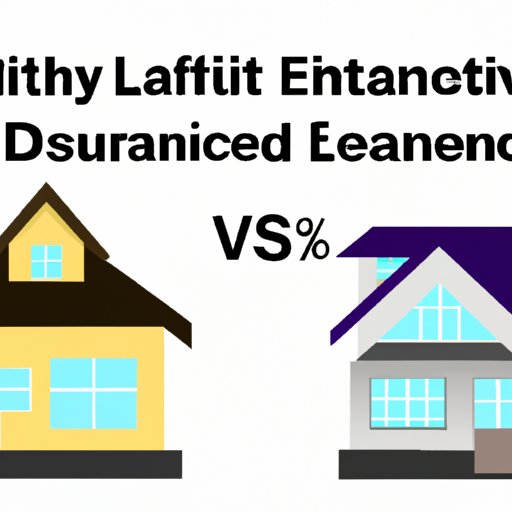Introduction
A home equity loan is a type of loan that allows homeowners to borrow money against the value of their home. The loan amount is determined by the difference between the homeowner’s current mortgage balance and the appraised value of the home. Home equity loans can be used for a variety of purposes, including home improvement projects, debt consolidation, or other large expenses. But can you get a home equity loan on an investment property?
Exploring the Requirements for Home Equity Loans on Investment Properties
If you’re looking to take out a home equity loan on an investment property, you should be aware of the various requirements that need to be met. These include:
Credit Score Requirements
The credit score required to qualify for a home equity loan on an investment property may vary depending on the lender, but generally speaking, lenders will require a good to excellent credit score – usually in the range of 680 or higher. A good credit score not only shows that you are financially responsible, but it also indicates that you are likely to make payments on time.
Down Payment Requirement
Another requirement for a home equity loan on an investment property is a down payment. Most lenders will require a minimum 20% down payment for a home equity loan on an investment property. This is because the lender wants to ensure that you have enough equity in the property to cover the loan amount.
Income and Debt-to-Income Ratio Requirements
In addition to a good credit score and a down payment, lenders may also require proof of income and an acceptable debt-to-income ratio. Your debt-to-income ratio is calculated by dividing your total monthly debt payments (including the new loan) by your gross monthly income. Lenders typically want to see a debt-to-income ratio of no more than 43%.
What to Consider Before Applying for a Home Equity Loan on an Investment Property
Before applying for a home equity loan on an investment property, there are a few things you should consider. These include:
Tax Implications
When taking out a home equity loan on an investment property, it’s important to understand the potential tax implications. Depending on how you use the loan proceeds, you may be able to deduct the interest from your taxes, which could potentially save you money. However, if you use the loan proceeds for personal expenses, you will not be able to deduct the interest.
Repayment Terms
It’s important to understand the repayment terms of the loan before taking it out. Home equity loans typically have fixed repayment terms, so you should know exactly how much you need to pay each month and when the loan will be paid off. You should also check to see if there are any prepayment penalties associated with the loan.
Fees and Interest Rates
It’s also important to understand the fees and interest rates associated with the loan. Home equity loans typically come with higher interest rates than traditional mortgages, so you should make sure you understand the terms of the loan before signing anything. You should also check to see if there are any closing costs or other fees associated with the loan.

Assessing Your Eligibility for a Home Equity Loan on an Investment Property
Once you’ve considered the potential tax implications, repayment terms, fees, and interest rates of a home equity loan on an investment property, it’s time to assess your eligibility. To do this, you should:
Understand Your Credit Score
Your credit score will play a major role in determining whether or not you qualify for a home equity loan on an investment property. Make sure you understand your credit score and what it means for your chances of being approved for a loan.
Determine Your Debt-to-Income Ratio
Your debt-to-income ratio is another important factor in determining your eligibility for a loan. Calculate your ratio and make sure it is within the acceptable range for the lender.
Estimate Your Equity
Finally, you should estimate how much equity you have in the property. Generally speaking, lenders will require a minimum 20% down payment for a home equity loan on an investment property, so make sure you have enough equity to meet this requirement.

Advantages and Disadvantages of Home Equity Loans on Investment Properties
Home equity loans on investment properties offer several potential benefits, but there are also some potential drawbacks. Here are some of the advantages and disadvantages of taking out a home equity loan on an investment property:
Advantages
- You can use the funds for a variety of purposes, including home improvements, debt consolidation, or other large expenses.
- Interest payments on the loan may be tax-deductible.
- You can access funds quickly and easily.
Disadvantages
- Home equity loans typically come with higher interest rates than traditional mortgages.
- There are often fees and closing costs associated with the loan.
- You may be putting your home at risk if you fail to make payments.

Understanding the Risks of Home Equity Loans on Investment Properties
When considering a home equity loan on an investment property, it’s important to understand the risks involved. These risks include:
Risk of Default
The most obvious risk is the risk of default. If you fail to make payments on the loan, you may be putting your home at risk. Be sure to consider your financial situation carefully before taking out a loan and make sure you can make the payments on time.
Potential for Loss of Equity
Another risk is the potential for loss of equity. If the value of the property decreases, you may end up owing more than the property is worth. This could put you in a difficult financial situation.
Interest Rate Risk
Finally, there is the risk of rising interest rates. If interest rates rise, your monthly payments will increase, which could put a strain on your finances.
Conclusion
Home equity loans on investment properties can be a great way to access funds quickly and easily, but they come with certain risks and requirements. It’s important to understand the requirements, consider the potential tax implications, and assess your eligibility before applying for a loan. Additionally, understand the risks involved and make sure you can make the payments on time. Taking out a home equity loan on an investment property can be a great way to access funds, but it’s important to do your research before taking the plunge.
(Note: Is this article not meeting your expectations? Do you have knowledge or insights to share? Unlock new opportunities and expand your reach by joining our authors team. Click Registration to join us and share your expertise with our readers.)
